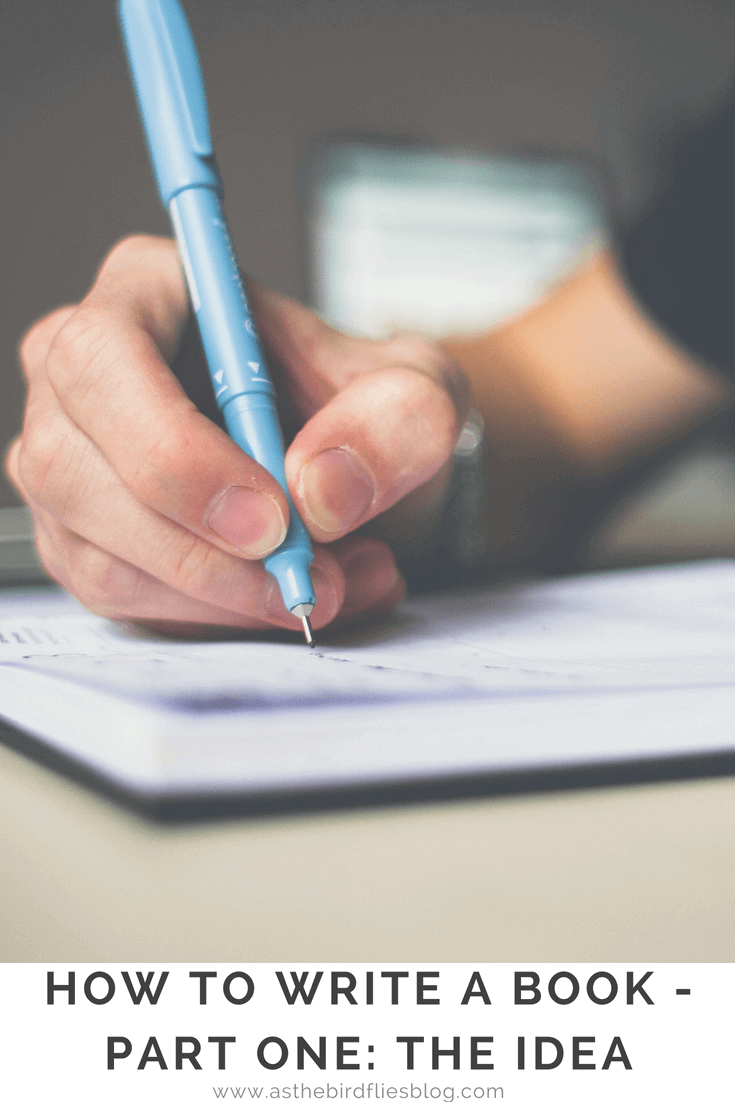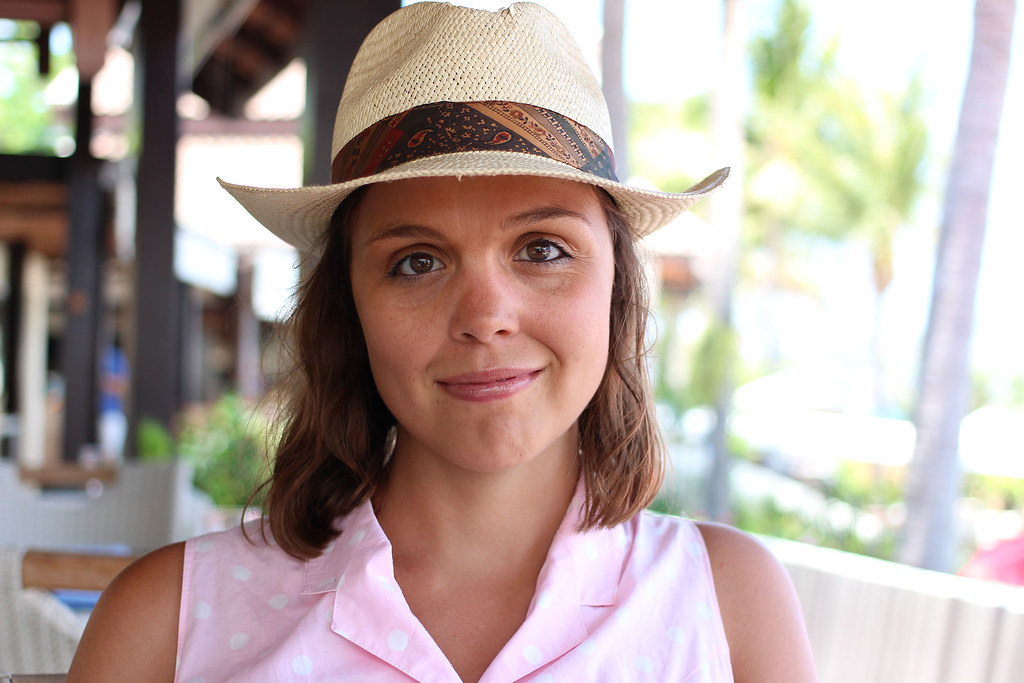How to Write a Book: Part One - The Idea
Welcome to How to Write a Book!
Welcome to the very first part of my How to Write a Book series documenting all the steps I take in writing a book. Today we're starting at the beginning and I'm sharing how I came up with my story idea. The second part is then all about story development and the following third part tackles writing a story or book outline. Be sure to check out this tag to find all the posts in this series, and you can find lots of writing advice on my blog here., and it will document the steps, processes and journey involved in, well, how I write a book.
Sharing the journey of writing a book from start to finish is something I've been thinking about doing for a while now - years, actually - but I haven't for various reasons (popping out a child, post-natal anxiety and depression, and taking a break from blogging and writing being the big ones) but now I've found a blogging and writing rhythm that works fairly well for me, I hope to slot this into my writing and publishing schedule (well, doesn't that make me sound much more professional than I really am!?). Also, I think I have finally found an idea for a book - possibly, hopefully my first finished novel - that I'm really excited by. It's an idea that I can actually see myself working on for a long time, to completion, I hope, as I've started more than a few novels in recent years and nearly all have stalled at some stage. (You can read my reasons why I think writing a novel is so hard here.)
Now before we go any further, yes, I know I'm currently halfway through my second pregnancy and yes, I know that baby is going to have to come out of me and some point and will require all the attention, time and effort that a baby demands, but I also know from previous experience that it's okay to take a break if I want or need to, that it's okay to switch up what I do on this blog and with my books because they are mine to play with. That's the freedom I have as an indie author. That's the freedom I have as a creative person. That's the freedom I have as a human being. But I'm also hoping that starting the How to Write a Book series of posts will also help me stay accountable, motivated and committed to writing this book so feel free to follow along and nag, nag, nag me if I don't show up with an update for months.
Because I've wanted to document what writing a novel is like from start to finish for so long, it's also true that the risk of pressing pause or abandoning the writing and the sharing of the process is overridden by my deep set curiosity to share this process and ultimately do so to help other writers. I'm not sure if I will do a monthly update or an update as and when I have completed a certain stage in the process, but time will tell, and I hope it will prove useful whatever format it takes.
How I usually come up with ideas for my stories
I find it very hard to explain how I come up with ideas for my stories. I don't want to say "they just come to me" but that's sort of the way it feels upon first reflection. However, when I actually think about it the process is a bit more drawn out and complex.
I get most of my story ideas when I'm thinking about something else. In other words, I very rarely sit down and try to come up with an exciting new story idea, and if I did do that I'd put money on it not working. Instead, I get most of my story ideas when I'm actively thinking about or doing something else. Running, walking, reading, cleaning, showering, cleaning my teeth, daydreaming (definitely daydreaming!), playing with my son, brushing my teeth, going to the toilet, making dinner, making a cup of tea... It's while doing the most mundane, uninteresting of things that I most often "get" my story ideas, but that's all they are; ideas. They are hardly ever fully formed.
So what does that look like? More often than not the idea begins in my head as a question, often a "What if..." kind of question.
I remember running along the seafront in Brighton & Hove when we lived there briefly for a few months and I was looking out at the pebbled beach and I found myself wondering "What if a child wanted to know why some beaches are made of pebbles and others are made of sand?". That question formed the first spark of an idea that was my short story All the Beaches are Made of Pebbles.
I remember having a massage in Kuala Lumpur and as I lay flat on my front, my face poking through the cut out of the massage bed, I watched the feet of my masseur. Watching her painted toes curl a little in her flip-flops felt like such an intimate scene to witness and that got my wondering what kind of a life she had. That was the question I explored in the title story of Shy Feet: Short Stories Inspired by Travel.
When I was living in London, I was always amazed how for a city of 10 million people, I could very often bump into people I knew, and often didn't really want to see; ex-boyfriends, old bosses, bad dates, a school friend who used to tease me... It would always make me think that our lives overlap, even in a busy city like London. I was thinking about this when I pondered what would happen if one section of overlapping lives broke down, would there be a knock on effect? And it was this question I focused on in Routines in London Eyes.
When I stayed in a hotel in Barcelona I got inside a lift with the hotel porter and I because I was tired and he had nice broad shoulders I found myself staring intently at his back. That led me to wonder "What if he could feel me staring at him?" and I explored that idea further in the short story Home from Homes (also featured in Shy Feet).
Staying in another hotel in Rotterdam, named after a man who effectively built the city but also left it in shame after it was discovered he committed fraud, I was put up in the room named after his wife, Esther Pincoffs. "What if she could tell her side of the story?" I asked myself. And that was what I set about doing in Leaving Rotterdam in my collection Nine Women.
I suppose what I'm trying to say is that I allow my mind to wander. Yes, I have a naturally active imagination, but it's also true that I indulge it. I don't actively try to avoid daydreaming - because I've learned over many years that's when I have good story ideas!! - and I don't force myself to think up story ideas on demand, though maybe I should because to do so would be a superpower as a writer!
I also have to add that my partner has given me many ideas for stories too, and indeed my novella The Wait came about after he got out of the shower and asked me the question, "What if you wrote a story about a man who's in hospital but the reader doesn't know why he's there until the very end?". I also get ideas when reading about certain topics because they interest me so it's not fair to say I only get my ideas when daydreaming.
So how do I make sure I remember these ideas? Often when these questions interrupt my otherwise dreary or dull daydreams, I take a moment to open up a new note in the Evernote app on my phone, and I write the question down, or write a few sentences about what the story could be about. Sometimes it's a sentence describing where the story starts,, sometimes it's where the story ends, other times it's just a single scene that a story could grow around, and then I wait to see what happens... Kinda. But before I talk about that, let's go back to how I came up with this specific idea for the book I hope to write now.
How I came up with the idea for this book
Needless to say, because of my personal experience struggling with postnatal mental health problems for nearly 18 months after my son was born, I have been thinking about the themes connected to early, first-time motherhood for a long time, and after reading a few novels that do the same, I have been thinking about what a fictional story I wrote could "bring to the table". I have toyed with the idea of writing about post-natal depression and/or anxiety but ultimately I knew I wouldn't enjoy or stick with writing a book that solely focused on this. My writing is a mode of escapism and a source of fun, so I'm not sure writing about this in so much depth would work for me, and I know enough about writing fiction now to know that if the author struggles to be interested or engaged with a story, the reader will struggle too.
So for many months I was waiting for a "hook" I could hang these themes on, and it came to me maybe a year ago on a visit back to the UK to see family. I was actually in a coffee shop with my son and I was daydreaming a little while holding a bottle of water to my son's lips and watching the staff work behind their counter. Then almost out of nowhere a "What if..." question about a character struggling with post-natal depression or anxiety popped into my head. I don't want to reveal that full question just yet because while it doesn't give away the plot of the novel I hope to write, it does maybe reveal more than I want to at the moment. Also this original idea wasn't that exciting (it honestly sounds rather boring and predictable) but what happened next, the follow-on questions I began to ask myself started to make it all a lot more interesting.
As I walked back to my parents' house from the coffee shop, pushing my son's buggy up a gentle hill and feeling the warm sun on my face, I thought more about that What If. I asked myself more questions. I thought about the main character and what kind of person she would be. I created more characters. I thought about the story's setting and what sort of timeline it could cover. I began to think about how and where the story would start, and how and where it would end. And so on until I got home and had to get my boy some food, breaking that dreamy thought process and stopping me thinking about it for some time. To be honest, I don't think I thought about the story or these questions again for many months.
But I did think about it again and I went on to have many more "daydreaming sessions" related to this idea. Not as regularly as you'd think - sometimes I've gone for months without thinking of the idea - but inevitably the idea would come back to me and I would find it hard to stop thinking about it until something else distracted me or demanded my attention. Interestingly, I didn't put a single idea or word on paper after any of these sessions. In fact, I didn't write anything down about this idea until about a month ago. And when I started then, it was hard to stop and before I knew it I had an outline and even something close to a chapter breakdown...
How I (think I) know the idea is a good one
In some ways this is how I like to test out my ideas. If I don't write them down but they stick around anyway, popping back into my head at random times, then I know they're an idea worth pursuing. And after a year of thinking about this idea, I knew it had "legs", I also knew it went deep enough and had enough layers for a novel, rather than a short story. In case you didn't know with three short story collections to my name, I'm much better at thinking up short story ideas than ones for novels, so this was also encouraging and exciting for me.
I also like that there is a good balance of familiarity and foreignness about the idea. The What If question involves someone who is struggling after the birth of her fist child - and I have been that person - but it is not only about that. What she does next, or rather the situation she finds herself in is not one I found myself in, but I can imagine the reasons why it happened and I can somewhat empathise with them. I am also intrigued by the scenario and her motivations, and I'm very curious about how she will navigate it and what the outcome will be. This mixture of writing about something I know firsthand but also exploring a situation that is unknown but interesting to me feels like a really good place to start. I feel it will scratch both my itches of wanting to write about a personal experience but also providing escapism and fun while I do so. At least I hope this is the way it will go...
Being able to sit down and write a full outline of the story, and have some idea of the structure of the book, was also a good sign that I am on to something. Because I've been in the editing stage of my other books for so long (nearly a year) I've not really had a chance to experience that kind of flow with a new idea for a long time, and that felt good. I don't expect half of the plot I've mapped out to stay the same (and in many ways I hope it doesn't) but the fact that I could picture a beginning, a middle and an end already told me that all those days of daydreaming and thinking and asking endless What If questions may have paid off.
Only time will tell if this idea will go the full distance, and by that I simply mean getting to a finished first draft stage; thinking any further ahead than that makes me feel a bit dizzy! But I have a confidence in the idea and the themes, and yes, in the characters, that I trust. I can't explain the mechanics of this feeling because it is exactly that, a feeling, but I can say that I've felt it before for the short stories that have made it to publication so that again gives me some reassurance. I know I have a hell of a lot of work to do to turn the idea into a story, but it's significant that this excites me rather than terrifies me. Okay, it still terrifies me a bit, but I'm going to focus on the exciting part, thank you very much.
My advice for coming up with story ideas
- Believe that ideas can come from anywhere and everywhere. Keep an open mind about what you read, think and feel.
- Deliberately ask yourself "What if..." questions to help you come up with possible ideas.
- To begin with, write any and every idea down; don't risk losing it. (I do this using Evernote on my phone, or by sending myself an email.)
- If you think about a story idea again some time after you first had it, that's a good sign.
- While wanting to write a story immediately after an idea is also a good idea, it's not necessary. As you just read, I let my idea "brew" for nearly a year before I wrote anything down on paper.
- Don't worry about the regularity of your ideas or the number of ideas you have; you only need one to write a book.
- By the same token, don't think every idea is worth writing a book about! Try not to be precious with your story ideas; you will not run out of them, trust me!
- Trust and encourage your daydreaming! Give yourself time and space to let your mind wander. You are not wasting time. You are letting your mind explore things and that is the key to coming up with good story ideas.
So what's next in the How to Write a Book journey?
Good question! As I wrote down some notes for this story idea maybe two or three weeks ago, I found myself very quickly wanting to write out the story's outline, or rather an outline for the novel, because as I mentioned above I fully expect and half-hope it changes, It shocked me how quickly this came to me, and how easy it was (again possibly a sign it needs to change!). This is not typical of how I have approached writing novels or even short stories in the past. Previously, I have preferred to write maybe a paragraph or two of notes - a mini blurb for the story, if you will - and then I just start writing. I can see now why this approach works better for short stories than novels! A short story could possibly get written quite quickly following this, but a novel.... nope. That doesn't work. 
So because writing an outline was my next step in the process after coming up with my story's idea, this is the next step that I will write about. Watch this space!
And if you'd like to save or share this post, here's an image you can pin:


Frances M. Thompson
Londoner turned wanderer, Frankie is an author, freelance writer and blogger. Currently based in Amsterdam, Frankie was nomadic for two years before starting a family with her Australian partner. Frankie is the author of three short story collections, and is a freelance writer for travel and creative brands. In 2017, she launched WriteNOW Cards, affirmation cards for writers that help build a productive and positive writing practice. When not writing contemporary fiction, Frankie shops for vintage clothes, dances to 70s disco music and chases her two young sons around Amsterdam.
Find Frankie on Facebook, Twitter, Instagram, Pinterest, and Google+.
Find Frankie on Facebook, Twitter, Instagram, Pinterest, and Google+.

 On Writing: My Writing & Publishing Plans for 2023
On Writing: My Writing & Publishing Plans for 2023_x300.jpg?v=1) On Writing: The Year I Decided to Write for My Life
On Writing: The Year I Decided to Write for My Life On Writing: Best (& Easiest!) Creative Habits All Writers Should Try
On Writing: Best (& Easiest!) Creative Habits All Writers Should Try On Writing: How to Earn Money by Writing Stories
On Writing: How to Earn Money by Writing Stories On Writing: What Are The Different Types of Editors?
On Writing: What Are The Different Types of Editors? About the Blog & Frankie
About the Blog & Frankie Welcome to My Amsterdam Travel Blog!
Welcome to My Amsterdam Travel Blog! Welcome to My Luxury Family Travel Blog!
Welcome to My Luxury Family Travel Blog! Welcome to My Writing Blog!
Welcome to My Writing Blog! Lover Mother Other: Poems - Out Now!
Lover Mother Other: Poems - Out Now! I Write Stories That Move You
I Write Stories That Move You Order WriteNOW Cards - Affirmation Cards for Writers
Order WriteNOW Cards - Affirmation Cards for Writers Work With Me
Work With Me